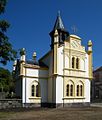world.wikisort.org - Czech
Mikulášovice (German: Nixdorf) is a town in Děčín District in the Ústí nad Labem Region of the Czech Republic. It has about 2,100 inhabitants.
Mikulášovice | |
|---|---|
Town | |
 Church of Saint Nicholas | |
 Mikulášovice Location in the Czech Republic | |
| Coordinates: 50°57′56″N 14°21′28″E | |
| Country | |
| Region | Ústí nad Labem |
| District | Děčín |
| First mentioned | 1449 |
| Government | |
| • Mayor | Miluše Trojanová |
| Area | |
| • Total | 25.85 km2 (9.98 sq mi) |
| Elevation | 414 m (1,358 ft) |
| Population (2022-01-01)[1] | |
| • Total | 2,076 |
| • Density | 80/km2 (210/sq mi) |
| Time zone | UTC+1 (CET) |
| • Summer (DST) | UTC+2 (CEST) |
| Postal code | 407 79 |
| Website | www |
Administrative parts
Villages of Mikulášovičky, Salmov and Tomášov are administrative parts of Mikulášovice.
Geography
Mikulášovice is located about 23 kilometres (14 mi) northeast of Děčín. It lies in the salient region of Šluknov Hook, on the border with Germany, adjacent to the municipal territory of Sebnitz.
Mikulášovice is situated in the Lusatian Highlands. The highest point is the mountain Tanečnice, at 598 metres (1,962 ft). The town lies in the elongated valley of the Mikulášovický Brook.
History
The first written mention of Mikulášovice is from 1446. The village was founded in the 12th century. In the 18th century, it was already an industrial municipality with tradition in knives sharpening. In 1794, the production of knives began.[2]
From 1938 to 1945 it was occupied by Germany, before it was liberated by Polish soldiers in May 1945 and restored to Czechoslovakia. In the final stages of World War II, in May 1945, the prisoners of the AL Bautzen subcamp of the Gross-Rosen concentration camp, evacuated from Bautzen to Mikulášovice by the Germans, were liberated there by Polish soldiers.[3]
Economy
The company Mikov, producing the popular knife Rybička, has its seat in Mikulášovice.
Notable people
- Franz Dittrich (1815–1859), pathologist
- Anni Frind (1900–1987), soprano opera singer
- Oskar Schäfer (1921–2011), Knight's Cross holder
Gallery
- Town hall and Church of Saint Nicholas
- Church of Saint Nicholas
- Church of the Ascension of Jesus
- Monument commemorating the liberation of the town by Poles in 1945
- Statue of saint John of Nepomuk
References
- "Population of Municipalities – 1 January 2022". Czech Statistical Office. 2022-04-29.
- "Z historie města" (in Czech). Město Mikulášovice. Retrieved 2021-07-14.
- "Subcamps of KL Gross- Rosen". Gross-Rosen Museum in Rogoźnica. Retrieved 14 June 2020.
External links
На других языках
[de] Mikulášovice
Mikulášovice (deutsch Nixdorf) ist eine Kleinstadt im Okres Děčín in der Region Ústecký kraj in Tschechien.- [en] Mikulášovice
Другой контент может иметь иную лицензию. Перед использованием материалов сайта WikiSort.org внимательно изучите правила лицензирования конкретных элементов наполнения сайта.
WikiSort.org - проект по пересортировке и дополнению контента Википедии







